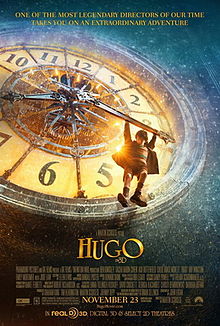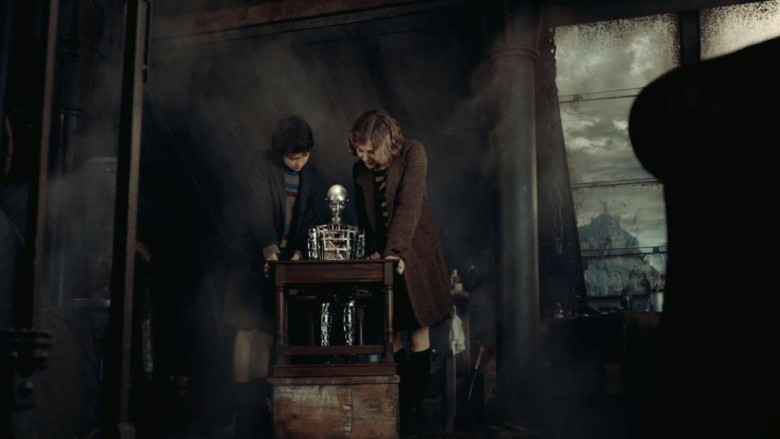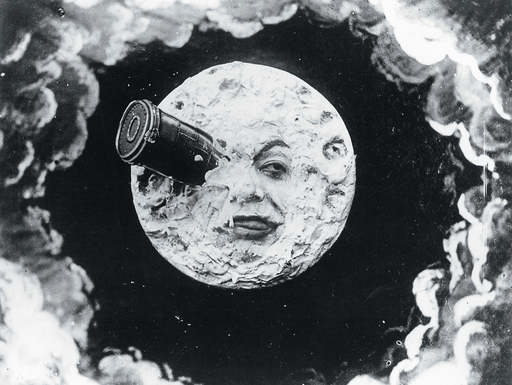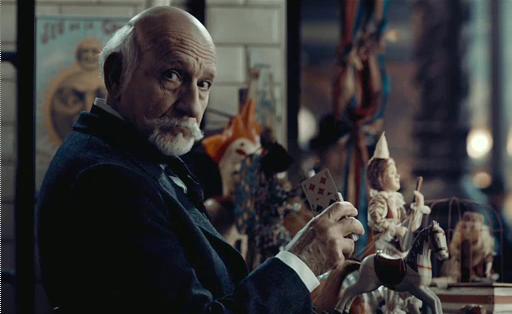
Few directors are as identified with a particular style and genre of film as Martin Scorsese, yet anyone who has followed his career knows that he’s had a surprisingly eclectic filmography from the get-go — the man followed Taxi Driver with a musical for fucksake! He’s done (and excelled at) slapstick comedy, romance, Edith Wharton, concert film, even a Dalai Lama movie. For a filmmaker whose name immediately conjures images of East Coast gangsters kicking the shit out of someone while a ‘Golden Oldie’ plays on the soundtrack, the man has been everywhere cinematically. Yet, aside from directing an episode of the 1980’s Spielberg anthology show, Amazing Stories, one of the few avenues Scorsese has yet to venture down is kid-skewing family entertainment. This unexplored genre, plus the intriguing gimmick of such a technical and stylistic filmmaker tackling 3D, makes Hugo a tantalizingly unique commodity amidst the already cramped holiday movie schedule.
Quick Take:
So how did this venture pan out? Quite well. Hugo is a lesser Scorsese work, though that categorization still places it well above your average film, especially your average family film. The 3D is largely pointless, though well-used by Scorsese, who is in top form here effortlessly using his skills to be cute/sweet without abandoning his style. And Asa Butterfield is absolutely wonderful as our poor pitiable hero Hugo. Robert Richardson’s cinematography is gorgeous. Howard Shore’s score bounces delightfully from playful to magical to heartbreaking. The film’s one sagging point, oddly enough, is probably its love-letter adulation to cinema — the very thing that certainly drew Scorsese to the project in the first place. All-in-all, Hugo is a stellar example of why it can be so much fun when a great filmmaker steps outside their wheelhouse.
The Story:
Set in the 1930’s, and based on Brian Selznick’s award-winning illustrated novel The Invention of Hugo Cabret, the film tells the woeful tale of Hugo, the young son of a widower and clockmaker (Jude Law). As a bonding activity, Hugo’s father retrieves a broken mechanical automaton from a museum warehouse for the twosome to fix up. They do fix it up, but the automaton (whose purpose is drawing a picture) cannot be activated without a special heart-shaped key. Tragically, Hugo’s father dies before the mystery is ever solved. Hugo goes to live with his drunken Uncle Claude (Ray Winstone), who lives inside the clock tower of Montparnasse train station in Paris. Here Claude trains Hugo to fix and maintain the station’s clocks, which Hugo does long after Claude drunkenly disappears. This is where the story picks up, with Hugo filling out his uncle’s function, while trying to evade being captured by the Station Inspector (Sacha Baron Cohen) and sent to an orphanage. Hugo has also made an enemy of a toy maker, Georges (Ben Kingsley), whose shop is in the station and who Hugo keeps stealing mechanical pieces from in order to continue working on the automaton (Hugo believes if he can get it to work, he’ll receive a message from his father). When Georges steals Hugo’s notebook, full of sketches of the automaton – which Georges believes Hugo himself stole – an unlikely relationship is kick-started, aided by the burgeoning friendship between Hugo and Georges goddaughter, Isabelle (Chloë Grace Moretz).

What Works:
Big shocker here: Scorsese is the biggest selling point of this Scorsese movie. Crazy-talk, I know. Hugo has a style-over-substance verve to it, that is all the more lush given that there is still plenty of substance beneath Scorsese’s whirling camera and 3D shenanigans. Scorsese is helped here by the fact that his preferred camera stylings have always been characteristically animated, with lots of movement, so in reality very little has changed. Scorsese doesn’t need to fake the broad and fantastical tone — a fate that made Ron Howard’s How the Grinch Stole Christmas utterly unwatchable (for me at least). And Brian Selznick’s book (adapted by The Aviator‘s John Logan) provides a solid base of layered themes for Scorsese to build from.
Scorsese opens the film with a CG-assisted dissolve that visually equates Paris’s busy streets with the inner-workings of a clock, and from there on out clocks are ever-present as a visual motif; a calculated and fitting motif, for the emotional theme of the film is function and the idea that happiness comes from fulfilling one’s function. This theme is hit home both subtextually and overtly (this is a family film, after all, we need overt stuff) throughout the film. Isabelle notes that the automaton looks sad, and Hugo says he thinks it just looks like it is waiting, waiting to perform its function — which, we can extrapolate, is one in the same with sadness in the world of Hugo. Those who are waiting to perform their functions in life are indeed sad. Machines are equated with happiness here. Hugo has a little speech about this, admiring machines because they only come with the exact number of parts they need to work (clearly IKEA didn’t exist during Hugo’s time). Like the automaton, Hugo and Georges – and the Jean Pierre Jeunet-esque collection of quirky love-lorn supporting characters populating the train station – are machines missing that crucial piece that will make them whole; the heart key. This is a great emotional backbone for a kids film, and one that Scorsese livens up the screen with. This isn’t a film that children will see years later and discover hidden meaning in, but if they grow into film buffs, they will later be able to better appreciate the opulent visual execution with which Scorsese expands upon the story.
This really is the Jeunet film that Jeunet never made, at least when it comes to our supporting cast, many of whom, admittedly, serve zero purpose in the greater narrative. As Jeunet so loves to do, our eccentric bevy of minor players pad out the simple story and provide diverting comic relief throughout the film with their one-note subplots. There are a pair of middle-aged would-be lovers played by Frances de la Tour and Richard Griffiths (both of Harry Potter) who are kept apart by a surly dachshund; there is the regal and kindly old book seller played by Christopher Lee whose goal is to find every book its proper person; there is the barely seen policeman whose marriage woes we learn of during humorous phone calls; and foremost there is the Station Inspector, who beneath his antagonistic exterior longs to court a pretty florist played by Emily Mortimer, but is made cripplingly insecure by the squeaky leg brace that routinely draws attention to the gimp leg he got in WWI. This is the kind of darling Amelie world-painting you either go for or you don’t. But the cast is great, and their stories are all cute, family-friendly goodtimes. It is easy to forget that Sacha Baron Cohen is an actor sometimes, and not just a comedic performance artist, but Cohen is a lot of fun as the over zealous Station Inspector, angrily limping around the station with his sidekick, a loyal doberman. The two even share a bath at one point. And though he doesn’t do much, Christopher Lee still exudes a powerful presence even at 89 years of age. It is just unspeakably great to see the man still working.
Unsurprising for a Scorsese film, the entire cast is top of the line, even down to the most minor of characters. Ray Winstone has really cornered the market on surly bastards, and though he only has a handful of lines in his brief section of the film, he really knocks Claude out of the park like only Winstone can. Jude Law is good. Helen McCrory does a 180 from Harry Potters‘ Narcissa Malfoy, here playing an elderly homebody who was once a gorgeous magician’s assistant. Michael Stuhlbarg continues his impressive chameleon act, taking a vacation from his steely work on Boardwalk Empire to play a compassionate film historian (though I suppose its less chameleon-like if all his roles are Jews). Chloë Grace Moretz does a better British accent than many adult actresses, and continues to mix shit up herself. From Hit Girl to Abby the vampire now to Isabelle, an excitable orphan who has been living out of literature and now lusts for true adventure in all its forms, Moretz’s career just keeps building steam. There are no weak links in the cast. But in the end, performance-wise, the film really comes down to Ben Kingsley and Asa Butterfield, whose characters are locked in the thematic bond — both machines missing pieces that only the other can provide. Kingsley, well, hold on, let’s get back to him in a second…
If all you know of Hugo is what you’ve seen in the trailer, I guess I’m about to get SPOILERY, but honestly I think anyone seeing the movie will be better served knowing this detail going in…
Isabelle wears a necklace that holds the heart-shaped key Hugo needs for the automaton. Midway through the film they active the mechanical man. It draws a picture and then signs it “Georges Méliès,” which a shocked Isabelle informs us is Ben Kingsley’s character’s name. For those unfamiliar with film history, Georges Méliès was the magician turned filmmaker responsible for one of cinema’s first enduring classics, A Trip to the Moon (Le Voyage dans la Lune). You know, this one:

This isn’t a spoiler at all if you’ve looked at the film’s IMDb or Wikipedia page; Ben Kingsley is credited as “Georges Méliès.” In any case, the reason you should know this going into the film is because Méliès and his story completely consume the second half of the film. Those who thought they were in for a magical fantasy about a boy running around a train station and trying to unlock a mysterious robot might be disappointed when Hugo swerves headlong into historical fiction and reveals itself to ultimately be a cinefile’s big sloppy french-kiss to cinema. For Scorsese fans, this is naturally when the film gets really interesting. Only Tarantino rivals Scorsese for unabashed, frenzied and outspoken film fandom, though Scorsese’s tastes skew significantly more towards what is considered “classic” cinema. Scorsese has also long been a proponent for film preservation, and by the end of Hugo it is pretty easy to see why Scorsese was drawn to this story. The big happy ending is that Méliès’s legacy is restored, which is a profoundly unusual element to have in a 3D kids movie when you think about it.
But film lovers will surely get a huge kick out of what Scorsese does with the Méliès stuff — hell, I walked away from the movie wishing that someone would render all of A Trip to the Moon in 3D (the few section we get are perfectly eye-popping, due to the stagey nature of Méliès’ sets). Kingsley does bear a resemblance to Méliès, and Scorsese clearly had a field day recreating Méliès’s lavish sets, costumes and creatures for Hugo‘s various flashbacks and film recreations, in which we see a youthful Méliès running around performing duties as director, actor, choreographer and FX master (we also see Scorsese in a cameo as a cameraman). In its second half Hugo becomes something of a Méliès biography, whose career took a sour turn during WWI and whose entire filmography was nearly lost to time. Kingsley is phenomenal in Méliès’ darker, bitter moments, and equally so in flashbacks to the magician’s happier glory days. In the second half, it feels like the film’s whole agenda changes. Scorsese becomes Hugo, whose function is saving Méliès. Scorsese wants this man’s memory kept alive, and has forged an entire movie to do so. Even more so, Scorsese wants to turn your children into giant film nerds. Parts of the movie play as rudimentary film school, as we see step-by-step demonstrations of how Méliès executed some of his impressive in-camera special FX.
Frankly, it is almost bizarre how far down the cinefile rabbit hole the film goes…
What Doesn’t Work:
I am a film nerd; I majored in Film Studies (hello never being able to get a real job, how are you?). So I loved the Méliès-centric second half of the film, but I can’t help but feel that it is something of a disservice to our hero, Hugo, and to the overall narrative.
99% of the people seeing Hugo this weekend will surely have almost no (likely totally no) knowledge of Méliès’ life. Which is good for the film, as the movie is structured like a mystery. At first you think the mystery is what will the automaton draw, but like I said, we learn that rather early on. The real mystery is — Who is Papa Georges? Then who is Georges Méliès? Why is he working in a train station toy shop? Why is he so angry? Why do people think he’s dead? This is all good fun, with Hugo and Isabelle perusing library books on cinema, and asking nosy questions. But we’re building up to a big reveal. Which is: Méliès was a popular magician, then popular filmmaker, then he wasn’t, now he’s old and bitter. That’s it. There is no greater mystery, including why his biggest fan, René Tabard the film historian, thinks he’s dead. He never faked his death or anything.
For Scorsese, or any film historian, this is a story of the utmost emotional weight. To think, how close Méliès came to being forgotten! Had it not (fictionally) been for this precocious little boy! But, for the average filmgoer, will this feel important? They didn’t know who Méliès was prior to stepping into the movie. Likely, they won’t necessarily feel their lives have been enriched by knowing who he is now — if they even assume he’s a real person; for all they know Scorsese made him up. There is a moment in the film when Hugo is trying to get Papa Georges’ wife, Mama Jeanne, to explain to him what the hell is going on and why his father’s automaton wrote Méliès’ name. Mama Jeanne won’t say, and earnestly tells Hugo that no child so young should know such terrible sadness as that which plagues Papa Georges. Umm. Pardon? Hugo’s mom died. Then his dad died. Then his drunken uncle forced him to live in a clock tower, and then abandoned him. Now Hugo needs to evade capture and steal food on a daily basis. And he’s just a child. And this woman has the audacity to imply that the fact that Georges Méliès was once a rich and successful entertainer and is now forced to work in a shop (that he owns, mind you), like some common slob is worse and sadder than the horrible life Hugo has already led? Or that Isabelle has led? Her parents are dead too! My parents are still alive, but I’m pretty confident that both of your parents dying when you’re a little kid is probably the most devastating thing that can ever happen to you, short of your own child dying when you’re an adult. So, while in a real-world historical context, the preservation of Méliès’ work and legacy may be very important to the art world, in a fictional story that had previously been about a poor urchin struggling to find love and answers and stability, there is definitely a certain level of who gives a shit about movies to the direction the film ultimately goes. Cinema hadn’t even been a thematic element in the first half of the film. (Again, I loved all this stuff. I’m just sayin’.) Hugo finds function and happiness in “fixing” Méliès, so it all plays just fine, but aspects of it did leave a weird feeling behind for me after the film ended. I especially have to wonder how successful Scorsese will be at convincing the children this movie is being aimed at that any of this matters. Or is as much fun as Hugo running around inside a giant clock. I fear the second half may bore little ones.
Aside from the inevitable villain-to-sweetheart arc of the Station Inspector, none of the other train station characters play a role in the greater story. They’re there to provide colorful and adorable asides, sprinkled throughout the run-time and then add to the Shakespearean onslaught of happy endings during the denouement. This can all loosely be tied into the clockwork theme, the idea that they’re all parts of the train station who aren’t fitting into place. This works well enough on a kids film level, but I would have liked some of the characters, particularly Lee, to have felt more relevant. Or, oddly enough, if we’d simply had more characters, creating an Altman-esque web. As it was, with the Station Inspector playing such a pivotal role, the middle-aged lovers and Lee felt conspicuously superfluous.

Theater or Rental or Skip It:
The lush look of the film is definitely deserving of the big screen, especially for those who dig 3D. You probably won’t see better live-action 3D for quite a while. Though, if I had children, or had abducted some, I’d take them to The Muppets this weekend. They will enjoy it more, and likely so will you. So maybe see Hugo next weekend?
Rating: 




Out of a Possible 5 Stars